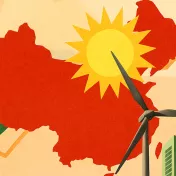Global decarbonisation will stem from a wide array of policy instruments: regulatory frameworks, long-term low-carbon strategies, technology development and transfer and fiscal and market incentives. As long as the prices of established fossil fuel technologies remain far below their true cost to society, it will be difficult to push them out of the market. A coordinated effort to phase out fossil fuel subsidies and establish carbon pricing schemes and domestic floor prices throughout the G20 would be a major step forward.
The complete phase-out of coal, oil and gas use until 2050 - that is what the global community has tasked itself to do in the Paris Agreement. The G20, representing the world´s largest economies and more than 75% of global greenhouse gas emissions, will play a decisive role in achieving this ambition. The low-carbon transformation of the world energy system and the whole economy has to start immediately, providing investors with clear, binding and long-term signals needed to avoid locking-in carbon intensive infrastructure for decades.
Therefore, national road maps towards decarbonisation are of great importance. At the Hamburg Summit in July 2017, the G20 should commit to presenting their long-term strategies until 2018 at the latest - including milestones and concrete actions towards climate neutrality by 2050. At the same time, the G20 should agree on another key policy: the introduction of carbon prices that speak the ecological truth - or are at least getting closer. This can be achieved by the German G20 presidency, starting in December.
Long-term strategies can only deliver when based on a mix of the most suitable policy instruments, such as strict emission regulation, support schemes for research and development of new technologies, frameworks and guidelines for long-term infrastructure or the ban of particularly climate-damaging projects or processes. Price signals that account for the external costs of carbon are also essential. Carbon prices provide multiple benefits: they affect the entire economic system across sectors and shift investments from greenhouse-gas-intensive technologies and processes to renewable and clean ones. Also, by making polluters pay for their emissions, they create revenues for governments that can be used to support a fair and fast low-carbon transition.
For example, revenues from carbon pricing could be reinvested into green and clean-energy infrastructure, or to prevent or lessen energy poverty. Scientific studies show that revenues from carbon pricing could contribute substantially to achieving several of the global Sustainable Development Goals (SDG). Minimum prices on carbon, coordinated between the world´s largest economies and increasing over time, represent a unique opportunity to support this transformation.
Gradually increasing carbon price signals would enhance planning certainty and lessen the likelihood of abrupt policy changes that could potentially lead to economic turbulences. The coordination between the G20 countries would reduce disadvantages for energy-intensive companies competing in international markets. A road map for the implementation of minimum carbon prices in the G20 would certainly start with differentiated price levels between developed and emerging countries such as India.
There are two sides to getting carbon prices right. One concerns the phase-out of fossil fuel subsidies: following the lead of this years’ G7 summit, the G20 should commit to eliminate fossil fuel subsidies until 2025 at the latest – if possible until 2020. CO2-intensive industries are being massively subsidised. In 2015, the G20 states alone spent about 440 billion US-Dollar in direct subsidies (for production and consumption). If external costs caused by air pollution and health damages are taken into account, the quasi-subsidies rise to a staggering 150 Dollar per tonne of CO2, according to calculations by the International Monetary Fund (IMF).
The other side concerns the appropriate price level for CO2 emissions: CO2 prices, while implemented gradually, should reflect the full social cost of carbon – be it by way of levies, taxes or effectively designed emission trading systems (ETS). Current systems – such as the EU ETS – have failed to deliver on transformation mainly due to the extremely low price levels. Environmental taxes were weakened by many exceptions or – as in Germany – not adjusted to inflation.
The option to use international 'offsets' – avoiding domestic obligations through funding mitigation projects in other countries - as well as detrimental effects of such projects in developing countries have strongly discredited market mechanisms in recent years. However, that doesn’t change the fact that investment decisions are based on cost assessment, risk appraisal and expected risk-adjusted returns. As long as the prices of established fossil fuel technologies remain far below their true cost to society, it will be difficult to push them out of the market.
Recent developments within some G20 countries are encouraging: France has announced to introduce a floor price for CO2, similar to the existing carbon price in the UK. China and Mexico will start national emission trading schemes in 2017 and 2018 respectively, South-Africa announced a carbon-tax for 2017, and India recently increased its fees on petroleum products and coal use. On state level, a variety of carbon pricing mechanisms exist in both the US and Canada, such as the California hybrid system combining ETS with a floor price. According to recent reports, Hillary Clinton may support a national carbon tax in the US if elected president.
The upcoming German presidency has the potential to fuel this dynamic within the G20. A courageous reform of the EU ETS and the elimination of fossil fuel subsidies in Germany and the EU would provide a firm basis for negotiating an ambitious outcome at the 2017 G20 Summit in Hamburg.
- With financial support by Stiftung Mercator. Germanwatch is responsible for the content. -
- This post was first published, in German, 16.9.2016 on www.klimaretter.info -




